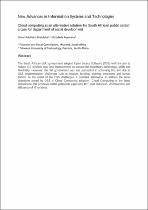 ResearchSpace
ResearchSpace
Cloud computing as an alternative solution for South African public sector: A case for Department of Social Development
JavaScript is disabled for your browser. Some features of this site may not work without it.
- ResearchSpace
- →
- Research Publications/Outputs
- →
- Book Chapters
- →
- View Item
| dc.contributor.author |
Maluleka, SM

|
|
| dc.contributor.author |
Ruxwana, Lennox N

|
|
| dc.date.accessioned | 2019-05-07T06:20:08Z | |
| dc.date.available | 2019-05-07T06:20:08Z | |
| dc.date.issued | 2016-03 | |
| dc.identifier.citation | Maluleka, S.M. and Ruxwana, L.N. 2016. Cloud computing as an alternative solution for South African public sector: A case for Department of Social Development. In: New Advances in Information Systems and Technologies, Springer International Publishing: Switzerland | en_US |
| dc.identifier.isbn | 978-3-319-31232-3 | |
| dc.identifier.uri | https://link.springer.com/chapter/10.1007/978-3-319-31232-3_45 | |
| dc.identifier.uri | DOI 10.1007/978-3-319-31232-3_45 | |
| dc.identifier.uri | http://hdl.handle.net/10204/10972 | |
| dc.description | Copyright: 2016, Springer International Publishing: Switzerland. Due to copyright restrictions, the attached PDF file only contains the abstract of the full-text item. For access to the full-text item, please consult the publisher's website. | en_US |
| dc.description.abstract | The South African (SA) government adopted Open Source Software (OSS) with the aim to reduce ICT services cost, less dependencies on outsourced proprietary technology, skills and flexibility. However, the SA government was less successful in achieving this aim due to OSS implementation challenges such as support, funding, training, awareness and human factors. In the midst of the OSS challenges, a potential alternative to address the same objectives aimed by OSS is Cloud Computing adoption. Cloud Computing is the latest phenomena that promises better potentials especially ICT cost reduction, effectiveness and efficiency of IT services. The purpose of this study was to explore the feasibility of Cloud Computing adoption in SA government as cost effective approach for ICT services. To achieve this purpose, the study applied mixed research methods, selected a single case study. A triangulation of data collection methods was used to promote validity and reliability of study findings, where primary data was collected using questionnaires, interviews, and document review. The Diffusion of Innovation (DOI) was employed as the underpinning theory that guided the study. Key findings reveal that Cloud Computing solution promise to be a cost effective alternative for ICT services. The study recommended Cloud Computing as a cost effective alternative for ICT services in SA government. | en_US |
| dc.language.iso | en | en_US |
| dc.publisher | Springer International Publishing | en_US |
| dc.relation.ispartofseries | Workflow;19893 | |
| dc.subject | Cloud Computing | en_US |
| dc.subject | Open Source Software | en_US |
| dc.subject | Innovation | en_US |
| dc.subject | Government | en_US |
| dc.title | Cloud computing as an alternative solution for South African public sector: A case for Department of Social Development | en_US |
| dc.type | Book Chapter | en_US |
| dc.identifier.apacitation | Maluleka, S., & Ruxwana, L. N. (2016). Cloud computing as an alternative solution for South African public sector: A case for Department of Social Development., <i>Workflow;19893</i> Springer International Publishing. http://hdl.handle.net/10204/10972 | en_ZA |
| dc.identifier.chicagocitation | Maluleka, SM, and Lennox N Ruxwana. "Cloud computing as an alternative solution for South African public sector: A case for Department of Social Development" In <i>WORKFLOW;19893</i>, n.p.: Springer International Publishing. 2016. http://hdl.handle.net/10204/10972. | en_ZA |
| dc.identifier.vancouvercitation | Maluleka S, Ruxwana LN. Cloud computing as an alternative solution for South African public sector: A case for Department of Social Development.. Workflow;19893. [place unknown]: Springer International Publishing; 2016. [cited yyyy month dd]. http://hdl.handle.net/10204/10972. | en_ZA |
| dc.identifier.ris | TY - Book Chapter AU - Maluleka, SM AU - Ruxwana, Lennox N AB - The South African (SA) government adopted Open Source Software (OSS) with the aim to reduce ICT services cost, less dependencies on outsourced proprietary technology, skills and flexibility. However, the SA government was less successful in achieving this aim due to OSS implementation challenges such as support, funding, training, awareness and human factors. In the midst of the OSS challenges, a potential alternative to address the same objectives aimed by OSS is Cloud Computing adoption. Cloud Computing is the latest phenomena that promises better potentials especially ICT cost reduction, effectiveness and efficiency of IT services. The purpose of this study was to explore the feasibility of Cloud Computing adoption in SA government as cost effective approach for ICT services. To achieve this purpose, the study applied mixed research methods, selected a single case study. A triangulation of data collection methods was used to promote validity and reliability of study findings, where primary data was collected using questionnaires, interviews, and document review. The Diffusion of Innovation (DOI) was employed as the underpinning theory that guided the study. Key findings reveal that Cloud Computing solution promise to be a cost effective alternative for ICT services. The study recommended Cloud Computing as a cost effective alternative for ICT services in SA government. DA - 2016-03 DB - ResearchSpace DP - CSIR KW - Cloud Computing KW - Open Source Software KW - Innovation KW - Government LK - https://researchspace.csir.co.za PY - 2016 SM - 978-3-319-31232-3 T1 - Cloud computing as an alternative solution for South African public sector: A case for Department of Social Development TI - Cloud computing as an alternative solution for South African public sector: A case for Department of Social Development UR - http://hdl.handle.net/10204/10972 ER - | en_ZA |





